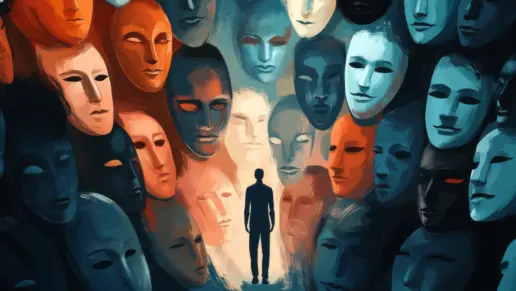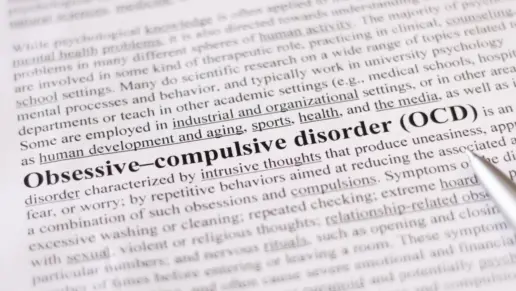People with a mental health disorder are more likely to experience a substance use disorder. According to a report by the Substance Abuse and Mental Health Services Administration (SAMHSA), approximately 21.5 million adults in the United States have a co-occurring disorder.
21.5 Million
Adults Have Co-Occurring Disorders
What Is ADHD or Attention Deficit Hyperactivity Disorder?
Attention deficit hyperactivity disorder (ADHD) is a developmental disorder that includes persistent symptoms of inattention with either hyperactivity or impulsivity that interfere with your daily living or development.
If someone is struggling with ADHD then they will likely experience an ongoing pattern of those behaviors. Symptoms can include impulsiveness, disorganization, poor time management skills and trouble multitasking. In some cases, individuals can struggle with feelings of paranoia at times.
If you are diagnosed with ADHD then you might be prescribed either a stimulant or non-stimulant medication. Stimulants can be either short or long acting and include medications such as Adderall, Vyvanse, and Ritalin. Medications such as clonidine and Strattera are some of the non-stimulant medications.
Oftentimes, ADHD is diagnosed as a child but there are times when adults are diagnosed. This can be due to being misdiagnosed as a child or not understanding the signs and symptoms until adulthood. To be diagnosed, adults must show at least five symptoms of inattention, hyperactivity and/or impulsivity for at least six months.
This condition can be severely underdiagnosed in women though the causes of the disparities are unknown. Social norms and gender biases in clinical practices may play as much of a role in such disparities as physiological or neurological differences do, if not more so.
ADHD symptoms in women are very similar to those in men but women are not as likely to have hyperactive/impulsive symptoms. Rather, they may struggle with inattention.
What Is Dual Diagnosis or a Co-Occurring Disorder?
People with substance use disorders can also struggle with mental health issues. Just because they can both exist at the same time does not mean that one caused the other. There are some common risk factors that can contribute to having a dual diagnosis such as genetics and environmental factors.
In some cases, if someone is struggling with substance use or mental health disorder then they may use drugs or alcohol as a way to self-medicate to relieve the symptoms. However, over time, this can make the symptoms worse.
Addiction and ADHD: Understanding the Link
It is important to understand the link between addiction and ADHD. If someone is struggling with ADHD then they might be more inclined to use drugs or alcohol. This is to make up for differences in the brain’s ability to process dopamine among those with ADHD.
Substance use can act as a trigger for ADHD but it does not cause it. Persons with untreated or undertreated ADHD are at an elevated risk of developing SUD due to ADHD related behavioral symptoms, such as poor impulse control.
However, treating ADHD for someone with a substance use disorder can prove to be difficult because the stimulant medications used to treat ADHD can also become habit forming. Nevertheless, when prescribed and managed properly, stimulant medications for ADHD can reduce the risk of developing an addiction and increase the chance for sustained recovery in those with SUD.
A recent study found that around half of young adults aged 20 to 39 with ADHD also have a substance use disorder. Comparatively, only around 24% of young adults without ADHD will struggle with addiction in their lifetime.
Half of individuals aged 20–39 with ADHD struggle with addiction—highlighting a strong link between ADHD and substance misuse.
About 1 in 4 young adults without ADHD will experience a substance use disorder in their lifetime.
Treatment Strategies for Co-Occurring ADHD and Substance Use Disorders
Treatment for ADHD, with or without a substance use disorder, requires a multidisciplinary approach with therapy and medications. If you are struggling with co-occurring ADHD and substance use disorders then it is recommended that you begin some type of therapy such as psychoeducation and motivational interviewing.
Additional treatment strategies can include the use of stimulant medications. Depending on what treatment strategy you consider, it is important to consider withdrawal symptoms, the stability of ADHD symptoms during abstinence from substance use and the occurrence of co-occurring psychiatric disorders.
Medication assisted treatment (MAT) can also be beneficial for those in addiction recovery. FDA approved medications such as buprenorphine and methadone, can be used to ease withdrawal symptoms, reduce cravings, and decrease the risk of potentially serious complications.
Therapies and Treatment Options for Co-Occurring Disorders
Individuals with co-occurring disorders are best served by an integrated treatment approach that incorporates varied types of therapy and treatment options. For most people, engaging in various forms of talk therapy proves to be the most beneficial. In some cases, this method of therapy can be combined with medication to help alleviate and manage the symptoms of ADHD.
Examples of Treatment Methods:
Cognitive Behavioral Therapy (CBT)
This therapy focuses on helping you change and challenge your irrational thoughts and negative behaviors.
Dialectical Behavior Therapy (DBT)
This type of talk therapy uses mindfulness to help you become aware and attentive to your current situation and emotional state. It also gives you coping skills to help control your emotions and reduce self-destructive behaviors.
Assertive Community Treatment (ACT)
This provides an individualized treatment approach and helps with outreach to your community.
This can involve long term treatment that takes you out of your ordinary environment, with its typical triggers and stressors, allowing you to focus exclusively on your recovery in a highly supervised and supportive setting.
Contingency Management (CM)
This type of treatment offers principles that encourage healthy behaviors by offering vouchers or rewards for desired behaviors.
These are great examples of treatment modalities but they aren’t your only options. For children and adolescents, sometimes including behavioral therapies such as brief strategic family therapy (BSFT), multidimensional family therapy (MDFT) and multisystemic therapy (MST) can provide more benefits.
Finding a Drug Rehab Near You
It is important to look into dual-diagnosis treatment centers that best fit your needs. It is a good idea to compare the ones that you’re interested in to see which ones can benefit you the most.
You can also learn more about rehab options to better understand the types of programs available and how they support people with co-occurring ADHD and substance use disorders.
To find drug rehab programs, you need to look into which programs take your specific insurance. If you are uninsured then there could be payment options such as grants and self-pay that will ensure your treatment is paid for. You need to understand all of your options as far as different types of treatment go.
There are residential treatment programs where you will stay for some time in a therapeutic environment. If you need a less restrictive environment then there are partial hospitalization (PHP) and intensive outpatient programs (IOP) that can be used to your benefit. The least restrictive level of care is outpatient treatment.
If you are interested in seeking treatment for ADHD and addiction, you can use our online tool to find rehabs or dual diagnosis treatment centers in your state that best fit your needs.
Additionally, it is best to call your desired programs to see what they offer and how they help treat your dual diagnosis. To find mental health treatment services in your area you can also call the SAMHSA National Helpline at 1.800.662.4357, visit the SAMHSA online treatment locator or text your ZIP code to 435748.
Addiction Centers That Treat Dual Diagnosis
Finding facilities near you…





